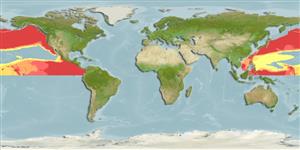Classificação / Names
Nomes comuns | Sinônimos | Catalog of Fishes(Gênero, Espécies) | ITIS | CoL | WoRMS | Cloffa
>
Lophiiformes (Anglerfishes) >
Himantolophidae (Footballfishes)
Etymology: Himantolophus: Greek, himas or himantos = leather strap, thong or leash (referring to the thick leathery illicium) + Greek, lopho or lophio = crest or tuft (referring to the baited illicium projecting from the head) (Ref. 86949).
Environment: milieu / climate zone / depth range / distribution range
Ecologia
marinhas batipelágico. Deep-water
Western Central Pacific. Eastern Central Pacific: San Clemente basin, off southern California, USA (Ref. 40966).
Tamanho / Peso / Idade
Maturity: Lm ? range ? - ? cm
Max length : 19.5 cm SL (female)
Descrição suscinta
Chaves de identificação | Morfologia | Morfometria
Raios dorsais (total) : 5; Raios anais : 4. Distinguishing characteristics of metamorphosed female: length of illicium 70-87% SL; each primary branch of posterior escal appendage simple, total length 4.0-4.5% SL; stem of illicium with a single pair of posterolateral appendage, length 1.0-2.0% in SL (Ref. 86949).
Ciclo de vida ou comportamento de acasalamento
Maturidade | Reprodução | Desova | Ovos | Fecundidade | Larvas
Pietsch, T.W., 1999. Himantolophidae. Footballfishes (deep-sea anglerfishes). p. 2029. In K.E. Carpenter and V.H. Niem (eds.) FAO species identification guide for fishery purposes. The living marine resources of the WCP. Vol. 3. Batoid fishes, chimaeras and bony fishes part 1 (Elopidae to Linophrynidae). FAO, Rome. (Ref. 12944)
Status na Lista Vermelha da UICN (Ref. 130435: Version 2024-2)
Ameaça para os humanos
Harmless
Uso pelos humanos
Pescarias: sem interesse
Ferramentas
Relatórios especiais
Baixar XML
Fontes da internet
Estimates based on models
Preferred temperature (Ref.
123201): 2 - 3.3, mean 2.5 °C (based on 466 cells).
Índice de diversidade filogenética (Ref.
82804): PD
50 = 0.5000 [Uniqueness, from 0.5 = low to 2.0 = high].
Bayesian length-weight: a=0.01995 (0.00906 - 0.04395), b=3.01 (2.83 - 3.19), in cm total length, based on all LWR estimates for this body shape (Ref.
93245).
Nível Trófico (Ref.
69278): 4.5 ±0.37 se; based on food items.
Fishing Vulnerability (Ref.
59153): Low vulnerability (14 of 100).
